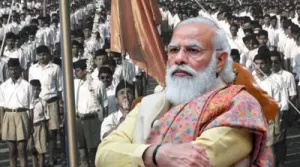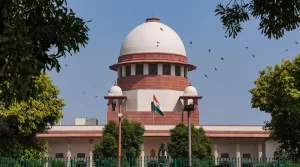The Rashtriya Swayamsevak Sangh (RSS) describes itself as a ‘cultural’ organisation, and it is correct in the sense that it aims at changing the very way of ‘being Indian’ and conduct of all private and public activities. ‘Culture’ in the RSS discourse does not refer to the vibrant reality energised by common everyday experiences and creative expressions in India. To the RSS, culture means the rhetoric of hatred and actual violence and a system for concealing those conflicts and oppressions through subterfuge. It also refuses to see the fundamentally diverse character of Indian cultural experience. The pre-independence national movement, on the other hand, recognised this diversity along with dialogue and historical ups and downs inherent in it. Hence the slogan ‘unity in diversity’.
Despite all its claims to being authentically Hindu/Indian, the RSS nationalism is wholly adopted from Western right-wing nationalisms. The admiration of Nazi methods of ‘purifying the national life’ contained in ‘We, Our Nationhood Defined’ (published under the name of M.S. Golwalkar in 1938; only much later was its authorship denied) can be easily seen reflected in day-to-day informal conversation of any RSS cadre or sympathiser. The glorification of lynchings and other heinous crimes is nothing but putting those methods into practice.
The RSS has so far, fortunately, not denied Golwalkar’s authorship of Bunch of Thoughts (1966). The 12th chapter of this book lists ‘internal threats’; and they are the Muslims, the Christians and the communists – in that order. Something very significant is implied here. Religious groups – Muslims and Christians – have been clubbed together with communists, an ideological category. After all, nobody is born with a communist or any other political orientation; you adopt and may also discard it. In Golwalkar’s view, the Muslims and Christians can cease to be ‘internal threats’ to the nation only if they discard their faith altogether. This is V.D. Savarkar’s idea of only those being part of ‘nation’ who have their holy lands within India. Fortunately for the Hindutva types settled in the US, the idea has not gained ground there to ask Hindus to take their holy dips in the Hudson or Colorado instead of Ganga or Godavari.
The one nation-one religion formula extends not only to ideologies (you are a threat, or ‘anti-national’ in current parlance, if you hold any worldview other than that of the RSS) but also everyday practices, language, food. The idea is to forcibly impose an RSS-approved uniformity from above on every aspect of life. ‘One nation, one election’ is only the latest in the series. Not surprisingly, the organisational principle of the RSS is Ek Chalak Anuvartitva – ‘under the instructions of one driver’.
Even the minimum application of rational, calm reflection will bring out the falsity of the RSS’s narrative of Indian history and will expose the dystopian character of its vision for the future. In order to discourage rational reflection, in Bunch of Thoughts and other ‘intellectual’ exercises by RSS ideologues there is so much emphasis on sentiments and feelings. As a matter of fact, exonerating verbal and physical violence in the name of religious or national sentiment is integral to right-wing mobilisations the world over, so is aggressive misogyny — women must remain within their limits and if they don’t, they must be brought to their senses. This psychology drives right-wing trolls on social media to use filthy abuse to teach women the ‘necessary lessons’.
The Indian national movement (with all its discontents) was broadly motivated by the idea of turning an ancient and continuous (an aspect which Nehru constantly emphasised) civilisation with all it diversity into a modern nation. Golwalkar rejected Indian nationalism as ‘reactionary’, dismissing its viewing imperialism as a common danger with derision:
“The theories of territorial nationalism and of common danger, which formed the basis for our concept of nation, had deprived us of the positive and inspiring content of our real Hindu nationhood and made many of ‘freedom movements’ virtually anti-British movements. Anti-Britishism was equated with patriotism and nationalism. This reactionary view has had disastrous effects upon the entire course of the freedom struggle, its leaders and the common people.” (Bunch of Thoughts)
The RSS conception of nationhood stands in violent conflict with an inclusive, democratic idea of India; and Nehru was most acutely aware of the this conflict. Contrary to an irrational and ahistorical RSS view of history and culture, Nehru appreciated its continuity. Over the famous metaphor of India being an ‘ocean of humanity’, he preferred to view “complex and mysterious personality of India” as “some ancient palimpsest on which layer upon layer of thought and reverie had been inscribed, and yet no succeeding layer had been completely hidden” (Discovery of India).
In the ocean, no trace of any river remains; in Nehru’s metaphor of a palimpsest, every inscription retains traces of its identity. How can an idea of India (in fact, even that of Hindu tradition) deny the significant contributions made by Islam and also the West, and yet claim to be authentic?
Just like a ‘palimpsest’, ‘Discovery of India’ is an apt metaphor for Nehru’s lifelong effort to appreciate the strengths and weaknesses of Indian culture. He indeed tried to modernise India but most certainly not ‘Westernise’ it, in the sense which the Hindu nationalists, and even some Gandhians and liberals, accuse him. His idea of modernisation was not merely cosmetic and ‘development’ oriented; but implied working for a just and humane society. His idea of India was not just about communal harmony, it was about far-reaching changes in economic, political and social spheres; such changes must occur ‘only in accordance with the genius of Indian people’ – as he put it in the presidential address to the Lahore congress in 1929.
Nehru told people constantly that in Indian politics, communalism of any hue represents the resistance to social change towards a more humane and just society. He knew the advantage Hindu communalism enjoyed: “That the Muslim organisations have shown themselves to be quite extraordinarily communal has been [apparent] to everybody. The [Hindu] Mahasabha’s communalism has not been so obvious, as it masquerades under a nationalist cloak” (An Autobiography).
Nehru deeply reflected on the ‘Indian society’s crisis of spirit’. In his foreword to the eminent Hindi poet Ramdhari Singh Dinkar’s Sanskriti ke Char Adhyay (Four Chapters from Culture) (1955), Nehru wrote:
“We developed at one and the same time the broadest tolerance and catholicity of thought and opinion as well as the narrowest social forms of behaviour. This split personality has pursued us and we struggle against it even today. We overlook and excuse our own failings and narrowness of custom and habit by references to the great thoughts we have inherited from our ancestors. But there is an essential conflict between the two and so long as we do not resolve it, we will continue to have this split personality.”
Such a frank assessment coming from a mass leader could be politically disastrous in our times of hurt sentiments. Nehru had earned the confidence of his people through his integrity, knowledge and insights. He never hid his discomfort with organised forms of religion, but admitted its positive role in human life. In Discovery of India, he said, “I find myself incapable of thinking of a deity or of any unknown supreme power in anthropomorphic terms… Any idea of a personal God seems very odd to me…I have been attracted towards the advaita (non-dualist) philosophy of the Vedanta… some kind of ethical approach to life has a strong appeal for me.”
In a conversation with R.K. Karanjia in 1960, he underlined “the need to find some answer to the spiritual emptiness facing our technological civilisation” (The Mind of Mr. Nehru).
But to him, the way out of this emptiness was not through the likes of an Asaram, Shri Shri or Sadhguru, etc. He sought the way through creative arts and reflection.
Nehru’s approach to religion and spirituality is perfectly in sync with the Hindu religiosity. Hinduism does not insist on uniformity of faith. Any Hindu (of course with the exception of Hindutva types) will see the validity of Nehru’s “appreciation of philosophical monism (not to be confused with monotheism) and ethical approach to life”. Nehru was not culturally deracinated, he was in fact so rooted that he did not need to wear his rootedness and dialogue up his sleeves.
The RSS has tried to appropriate Gandhi, Patel, Shastri, Bose, Subhash, Bhagat Singh, Tagore, even Ambedkar, but never Nehru. Because Nehru – the moderniser rooted in tradition – was firmly against the ideological vision of Hindutva and no one knows this better than Hindutva ideologues. They hate him precisely because he earned the trust, respect and faith of people the hard way, without catering to their baser instincts and phoney sentiments. They also fear him because he could connect with Indian people without using the religious idiom, he could chide them when needed as he had earned their faith not by endorsing reactionary attitudes, but by his attempts to lead them towards enlightenment. He was not merely a representative of people, but a true leader. It is this fear which has led to the pettiness not only on the part of the government, but also on the part of some media houses who undertake dirty tricks to erase his memories.
And that is why no amount of calumny is too much, and no low is low enough for demeaning Nehru. From his family life to his eating habits to his personal tragedies – everything is fair game to the RSS project to demolish Nehru.
(Purushottam Agrawal is a writer, academic and political commentator. Courtesy: The Wire.)




